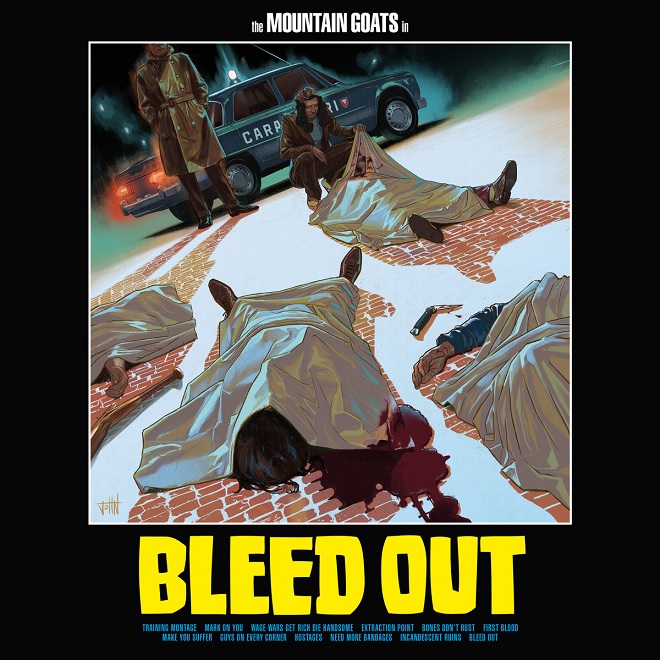SONGWRITER & PRIMARY GOAT JOHN DARNIELLE SAW 'BLOW OUT' AND OTHERS DURING HIS FORMATIVE YEARS

At Pop Matters, Robert Daniel Evers interviews John Darnielle about Bleed Out, which is the twentieth album by The Mountain Goats:
Spiritually similar to 2016’s Beat the Champ, an album that is about his love of professional wrestling, Bleed Out is head to toe inspired by his love of the cheese and the sleaze of revenge thrillers. “When people say ‘it’s so bad it’s good,’ that’s not correct. That’s not what I’m talking about. It’s that there’s, in a sense, obviously, not anyone can make a great movie, but sort of anyone with the capability can make a great movie, but every ‘off’ movie is off in its own way, and there’s real humanity …” (He interrupts himself to talk about Carnival of Souls).The album’s tone is set by its opening track, “Training Montage”, in which he declares quite decisively, “I’m doing this for revenge! / I’m doing this to try and stay true! / I’m doing this for the ones they had to leave behind! / I’m doing this for you!” This song lets you know exactly what you’re getting into here, in much the same way an action movie needs to set its tone in the first five minutes, lest it is mistaken for a romance.
Keeping things upbeat and amped up, “Wage Wars, Get Rich, Die Handsome” embodies the glory of the action hero, maybe the leader of a heist gang, maybe not the kind of guy you’d want to invite to a dinner party, but certainly one you’d enjoy watching blow shit up on-screen. Even its liner notes stay on theme.
The album is a rocker with some flares of saxophone and accompaniment by Alicia Bognanno from the band Bully, who also served as producer. Darnielle is a master storyteller, and Bleed Out is a kind of short story collection of heists, gang wars, car chases, and shootouts (less about plots and more about the feelings of the humans doing the action), utilizing all of the themes and tropes from his favorite titles. It is an album made up almost entirely of bangers, but it closes with a sigh of relief as its protagonist prepares for death. Reflecting on the ephemeral nature of existence, the narrator sings, “There’s gonna be a big spot where I once lay / And then there won’t even be a spot one day / Bleed out / I’m going to bleed out.”
The first movie John Darnielle of the Mountain Goats saw in a movie theater was The Wizard of Oz. It was 1971, and he was four or five. “That night, I very solemnly announced to my parents that I was going to marry Judy Garland when I grew up.” Aside from remaining a lifelong, dedicated Judy Garland fan, the screening of Oz left a lasting impression on him. “It was a very big experience for me,” he says. “I was utterly bowled over.”
This relationship with film would continue into adolescence during the late 1970s when parenting was less strict and he would get dropped off at the movies after school by himself. One standout from this time was 1977’s Orca, about a killer whale that gets revenge on a fishing boat that killed its pregnant mate. This thirst for stories of revenge started early. Of course, there were the daytime monster movies that would come on TV when they were living briefly in Milpitas, California (a location that appears in his latest novel). A favorite at the time was The Crawling Eye, a film that would appear two decades later on Mystery Science Theater 3000. A number of these elements would influence Darnielle’s more lurid cinematic tastes.
His entry into foreign films came courtesy of his stepfather (a character fans will remember as the villain of the Mountain Goats’ Sunset Tree album) and a recurring Sunday night film series at Pitzer College. Of his stepfather, Darnielle tells me: “He had grown up in a small Indiana town and aspired to be greater and learn things, and he would take me to foreign movies and teach me about Bergman, Pasolini, Fellini—those were his, sort of, big names.”
Darnielle favored Andy Warhol and was able to see his film, Trash, as a teenager. “It was a big night for me when I was 14,” he says. “If you wanted to see a Warhol movie, you just couldn’t; they weren’t around. He was, for those of us who listened to the Velvets, this legendary figure. You wanted to see what his movies were like. And Trash was a big, big thing for me.”
The programming at the Pitzer College Sunday night film series in Avery auditorium was every Sunday night for Darnielle. This is where he saw Kurosawa‘s Ran and Rashomon, Brian De Palma’s Blow Out, Wim Wenders’ Paris, TX, and of course, Ingmar Bergman’s Fanny and Alexander. These were formative, taste-making years. He was hooked—a certified cinephile. “We would all go, me and my friends Tom and Steve, the would-be intellectuals. We’d go to movies from seven to nine and then at nine go out for coffee and argue about what we’d seen.”



